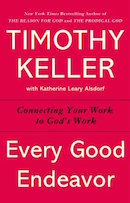The Gift: Gran Turino
Blog / Produced by The High Calling
Sam here. We’re reading The Gift: Creativity and the Artist in the Modern World by Lewis Hyde. Chapter 4 is about the bonds created through gift exchange and I can’t help thinking about a connection this has with Clint Eastwood’s latest film, Gran Turino.
I watched Gran Turino last weekend. The language and thematic elements are quite strong, be advised, but so is the story. Eastwood plays a cold, mean, Korean War veteran named Walt Kowalski. Kowalski hates minorities, particularly Asians, and especially the Hmong family who just moved in next door. When their teenage son, Thao, tries to steal Kowalski’s prized car (a Gran Turino), Kowalski nearly kills him.
Enter the binding beauty of gift exchange. In order to restore the Hmong family’s name, Thao’s parents, in line with their tradition, tell Mr. Kowalski that he must let Thao work for him. In other words, Thao must repay the debt incurred by his criminal behavior by serving Kowalski for a period of time. And Kowalski must accept. If he doesn’t, Thao and his family cannot be freed. It is an ironic situation. Only through a bond-servant agreement between these enemy parties can gift exchange occur, and, eventually, healing for both of them.
Hyde emphasizes that gift exchange produces relational bonds. Interestingly, Gran Turino flips the equation, causing the bond to produce the gift exchange. Either way, it’s true: Something powerfully right takes place when we give and receive gifts. Had Thao’s parents not pushed for this unique relationship, Thao may have missed valuable lessons; had Mr. Kowalski denied the request, he would have cursed Thao with unpaid debt and may have missed out on his own necessary healing. In the end, the gift relationship binds them.
I see allegorical references to Scripture in this movie, the most obvious one being Thao’s parents who author a unique relationship in order to reconcile a debt.
1. How have gifts bound you to others? To Christ?
2. Benjamin Franklin said, “When I am employed in serving others, I do not look upon myself as conferring favors but paying debts.” Do you see your work as paying debts (Not financial, of course)? If not, why not?
Post written by Sam Van Eman.
- Conclusion - The Gift: Work as Art
- Chapter 7 - The Gift: Strings Attached
- Chapter 6 - The Gift: I Am Woman?
- Chapter 5 - The Gift: All our Kin
- Chapter 4 – The Gift: Gran Turino
- Chapter 3 – The Gift: Generous Elves
- Chapter 2 – The Gift: Hike With Me
- Chapter 1 – The Gift: Don’t Be a Keeper
- Chapter 1 – The Gift: Laish and the Silo Effect
- Introduction – Mozart, Tiger Woods and Me: Gift 1-1/2
- Introduction – The Gift: Art, Work and a Ribbon





